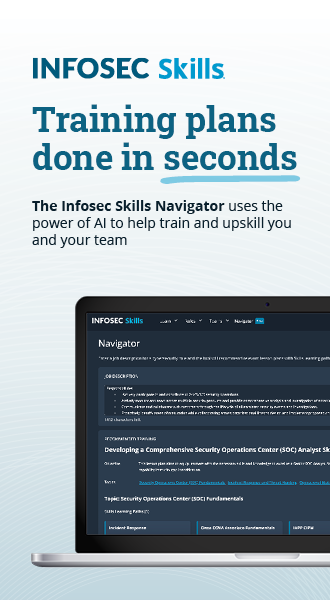Cybersecurity soft skills: Career benefits of public speaking
Cybersecurity professionals, in general, as well as those starting in the industry, are often told how vital it is to develop soft skills as well as their technical capabilities. Being able to communicate effectively with colleagues, sell others on the need for certain technologies, and convince others of the wisdom of following security policy — these are all vital abilities.
Lisa Tetrault has another take — how public speaking at conferences and events made her a better cybersecurity professional — and can make you one, too. Lisa is the senior director of global security operations at Arctic Wolf, where she spearheads the external and internal initiatives of the security operations center (SOC) team.
“There are only so many scanning tools you can master, but you can always improve your communication game,” she said on a recent Cyber Work Podcast when discussing the career benefits of public speaking. “A hugely deficient skill set in security is the ability to communicate, whether in written reports, a presentation to your team or the C-suite or telling conference attendees about your findings.”
What should you learn next?

After attending a few conferences, she realized that she had similar experiences, stories, and lessons to relay and that her knowledge could be of value to others. She began with short webinars where she could use cheat sheets. That helped her get out in front of people and get over any worry about being in front of an audience.
That led to smaller live conferences, mainly for students breaking into the space rather than a room full of seasoned security experts. As she grew in confidence, she decided to put in a proposal to speak at a more prestigious conference. It was a topic about a couple of anonymous compromises.
"I took for granted something that I dealt with all the time, didn't realize that others really didn't understand it, and didn't really know how to handle it," said Tetrault. "Afterwards, I was bombarded with feedback — I realized it was also a great way to network."
People would come up and say, “Can we talk about this? or, “Can I ask you a question about that?” That one talk ended up spawning other ideas, leading to other conference talks as she could see the different angles that interested people.
What should you learn next?

Learning from others
A big part of being able to speak in public is facing up to it and just doing it. Don’t start at a marquee event in front of thousands. Begin small and build up your confidence.
But there is another side to it — you can also watch others speak in public and learn from them.
Tetrault learned a lot by studying other effective speakers, how they engaged the audience and the different approaches they used. You don't necessarily have to be dynamic and forceful on stage. For some people, that may be a bridge too far. Be yourself and find a way that works for you and the audience.
By attending the talks, webinars and conference sessions, there are plenty of lessons to be learned and networking opportunities to benefit from. Meeting people with similar values and interests who want to collaborate with you to bring your ideas to fruition becomes easier.
"What I have learned through this whole process is the need for preparation, how to articulate better, how to use fewer words to get your point across more effectively, and how to engage people," said Tetrault. "As a side benefit, speakers are typically given free admission to conferences."
She also values conference attendance as a way to broaden your skillset. Many experts are featured, and it is almost impossible not to find some sessions dealing with aspects of IT and cybersecurity you are currently struggling with. That can aid people in making career pivots into other areas of cybersecurity they may not otherwise have considered.
Public speaking tips
Tetrault offered several tips. Preparation is vital. Practice your talk; perhaps say it out loud and record yourself. Or say it to one other person. That will help you refine the way you present it.
Thorough preparation also helps you avoid one of the significant failings of many conference presenters. Instead of communicating to the audience, they turn to the side and read off bullet points from their slides.
"You can't just be reading through your notes on a screen or on a laptop in front of you because people will obviously know," said Tetrault.
As you go over your basic script, allow the initial version to be too long and too wordy. As you refine it, pare it down and find more succinct phrases. Practice what to say with each slide so you don't have to read it off. But have it handy in case you lose your place.
"It takes hours of practice, especially your first couple of presentations," she said. "As you do it more often, you can often repurpose previous presentations, and the preparation time becomes much shorter."
Another tip for gaining experience is to attend smaller meetings with local chapters of associations. These often only consist of a handful of people in an informal atmosphere. Attend your local chapter, hear what others say, practice sharing your information and gather feedback.
Further advice: Consider joining your local Toastmasters group, where you are taught the art of public speaking and can gain invaluable experience in front of a knowledgeable and considerate audience. Co-presenting is another way to begin. Instead of doing an entire one-hour session, give a 10-minute slot with a group of others talking about a similar issue.
"It's not so daunting if you are co-presenting with other experienced presenters," said Tetrault. They will also impart some of their knowledge and experience to you, and some will even practice with you."
For more, watch the full Cyber Work Podcast, Cybersecurity public speaking techniques.






